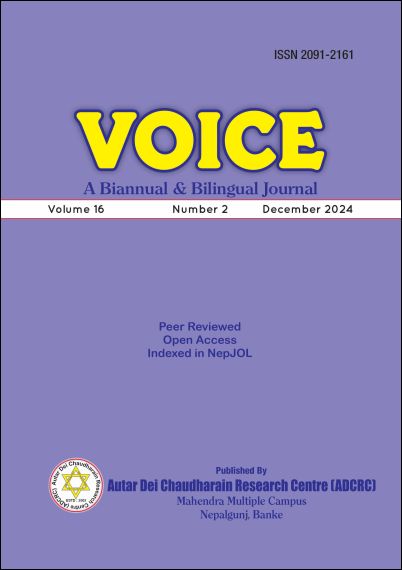Performative Quality in the Ritual of Matchmaking in Serena Nanda's Essay 'Arranging a Marriage in India'
DOI:
https://doi.org/10.3126/voice.v16i2.72781Keywords:
liminality, agency, matchmaking, arranged marriageAbstract
This research paper explores the performative quality in the ritual of matchmaking in arranged marriage in Hindu culture in the context of Serena Nanda's essay "Arranging a Marriage in India" through the lens of Victor Turner's theory of liminality. Turner's theory, which describes the transitional phase in rites of passage, is used to analyze the experiences of brides and grooms as they navigate the period between their pre-marital and post-marital identities. This liminal phase, characterized by ambiguity and openness, is marked by significant pressure from familial and societal expectations that also constrain personal autonomy. The role of the matchmaker is pivotal in guiding individuals through this transition, often reinforcing traditional norms and finding the space between the prospective bride and groom and even between their families and bringing them into negation in each and every steps of the process for agreement, engagement and marriage even suppressing individual desires. By examining the liminal state of the bride and grooms, this study highlights the complex interplay between societal structures and personal agency, demonstrating how traditional matchmaking practices enforce conformity for marriage and limit self-determination reflecting the rich cultural performativity. The research underscores high performative quality in the ritual of matchmaking with the potential for change within this liminal space, suggesting that the suspension of individual agency of bride and groom and others for prospective marriage and the reconfiguration of identities of bride and groom.
Downloads
Downloads
Published
How to Cite
Issue
Section
License
Copyright (c) 2024 Author

This work is licensed under a Creative Commons Attribution-NonCommercial 4.0 International License.
CC BY-NC: This license allows reusers to distribute, remix, adapt, and build upon the material in any medium or format for noncommercial purposes only, and only so long as attribution is given to the creator.




